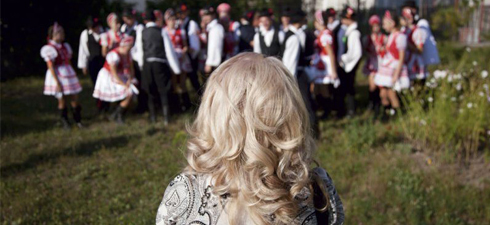Over the coming weeks, the first floor of the French delegation of the Calouste Gulbenkian Foundation in Paris, will be transformed into an entry point for today’s Europe. It is a Europe that encourages us to reflect and ask questions, and one that is not indifferent.
It is a Europe that is everything at once: beautiful and worrying, like its many problems, which range from the economic crisis to the social crisis. It is a Europe that is both familiar and foreign, as the 12 photographers, including three from Portugal, invited to interpret the the theme“European identities” show us with their art.
“The goal is not to describe or to criticise a European singularity”, points out one of the curators of the exhibition, Portugal’s Sérgio Mah, for whom “Europe is a superb ensemble of historical, geographical, spiritual and symbolic roots.”
Public and private worlds
Not surprisingly, then, in exploring the 12 series of photographs on show, visitors to the exhibition are presented with themes from both public and private worlds. For example, images that focus on the experience of motherhood as means to examine the feminine condition byMarie Sjøvold are set alongside urban scenes byGabriele Croppi. “The exhibition aims to provide a democratic space that is open to this type of concertina effect”, adds the Portuguese curator.
The first European Photo Exhibition Award (EPEA) is a joint initiative by four European foundations: the Portuguese Calouste Gulbenkian Foundation, Italy’sFondazione Banca del Monte di Lucca, the Norwegian Institusjonen Fritt Ord, and Germany’sKörber-Stiftung.
Each of the foundations designated a curator, and each of the curators was invited to select three photographers. Sérgio Mah, the curator appointed by the Gulbenkian Foundation, selected Catarina Botelho, José Pedro Cortes and João Grama for “their sensitivity to the theme of European identities”. Pietro Masturzo, Monica Larsen, Hannah Modigh, Frederic Lezmi, Linn Schröder, Davide Monteleone and Isabelle Wenzel complete the panel of artists presented.
Emerging photographers
“We wanted to show work by emerging photographers. So that ruled out artists that were already well-established in the world of photography”, points out Sérgio Mah, who emphasises project’s ambition to develop relations between the four institutions while promoting artists whose careers are now gaining recognition.
“And finally, it is also a project about a certain generation”, he remarks, because all of the selected photographers are aged between 29 and 37. Youth “always brings something positive, a freshness that is characteristic of openness and an availability for all types of approaches.”
After showing in Paris, the EPEA exhibition, which was inaugurated in Hamburg, will be traveling to Lucca, and then to Oslo, in a tour that takes in each of the four cities of the participating foundations. A second EPEA, which will present other artists, is already in preparation.
Was this article useful? If so we are delighted!
It is freely available because we believe that the right to free and independent information is essential for democracy. But this right is not guaranteed forever, and independence comes at a cost. We need your support in order to continue publishing independent, multilingual news for all Europeans.
Discover our subscription offers and their exclusive benefits and become a member of our community now!












